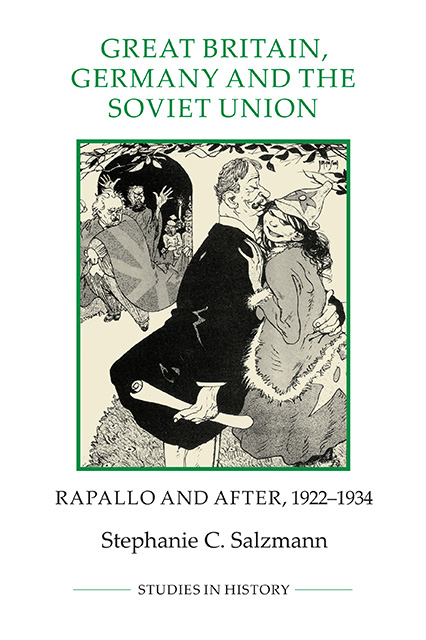Book contents
- Frontmatter
- Contents
- Acknowledgements
- Abbreviations
- Introduction
- 1 ‘It Nearly Overthrew the Applecart’: Lloyd George and the Treaty of Rapallo
- 2 ‘The Most Important Event Since the Armistice’: The Foreign Office and Rapallo
- 3 Rapallo’s First Test: The Ruhr Crisis
- 4 The Policy of Conciliation: Rapallo and the First Labour Government
- 5 The Battle for the German Soul: Locarno and the Treaty of Berlin
- 6 Rapallo and the Rupture of Anglo-Soviet Relations
- 7 Rapallo and the Decline of the Locarno Spirit
- 8 An Economic Rapallo?
- 9 Rapallo and the Disarmament Conference
- 10 The Rapallo Relationship and Hitler’s Rise to Power
- 11 The End of Rapallo: The German–Polish Non-Aggression Treaty
- Conclusion
- Bibliography
- Index
4 - The Policy of Conciliation: Rapallo and the First Labour Government
Published online by Cambridge University Press: 25 March 2023
- Frontmatter
- Contents
- Acknowledgements
- Abbreviations
- Introduction
- 1 ‘It Nearly Overthrew the Applecart’: Lloyd George and the Treaty of Rapallo
- 2 ‘The Most Important Event Since the Armistice’: The Foreign Office and Rapallo
- 3 Rapallo’s First Test: The Ruhr Crisis
- 4 The Policy of Conciliation: Rapallo and the First Labour Government
- 5 The Battle for the German Soul: Locarno and the Treaty of Berlin
- 6 Rapallo and the Rupture of Anglo-Soviet Relations
- 7 Rapallo and the Decline of the Locarno Spirit
- 8 An Economic Rapallo?
- 9 Rapallo and the Disarmament Conference
- 10 The Rapallo Relationship and Hitler’s Rise to Power
- 11 The End of Rapallo: The German–Polish Non-Aggression Treaty
- Conclusion
- Bibliography
- Index
Summary
‘The sun of England seems menaced by final eclipse’, wrote the English Review after – to everyone’s surprise – the Conservative Party had been defeated in the general elections of 6 December 1923. For the first time in British history Labour, in the eyes of many British ‘the party of revolution … with the design of destroying the very bases of civilised life’, was to form a government. British public opinion was divided between scepticism and the desire to give Labour a chance. The question of how British socialism would distinguish itself from its Russian counterpart was particularly important in this context. This issue became even more pressing when the cabinet of Ramsay MacDonald (both prime minister and foreign secretary) established diplomatic relations with the Soviet Union as one of its first political actions.
De jure recognition of Russia, a stabilisation of the European situation, the settlement of the reparation question and the strengthening of the League of Nations had been at the core of the Labour Party manifesto during the 1923 elections. The League was particularly important as a replacement for regional alliances and as a means to establish a system of collective security. Such a framework was regarded as suitable to prevent a close Russo-German alliance against the rest of Europe in the future. This, however, did not mean that the Labour Party regarded Rapallo at any time as a serious threat. Labour considered the German–Russian alliance to be merely an economic agreement, which the Allies themselves had caused by a hostile policy. The Allied powers had simply driven Germany and Russia into each other’s arms.
Labour’s policy was pragmatic. European stability could not be achieved without both German and Soviet involvement. The danger was that Germany might turn eastwards if no reparation settlement was found and dissatisfaction in the country persisted. On the other hand, improving relations with Russia was considered vital for domestic reasons. Britain still faced high unemployment, and a boost in foreign trade was urgently needed. Under the Lloyd George and subsequent Conservative governments Anglo-Soviet relations had reached a deadlock, with the Foreign Office’s open hostility towards Moscow blocking any initiative from business circles for a gradual approach. In Labour’s eyes this attitude could not be sustainedwithout further harm to the British economy. It was therefore worth exploring whether relations could be revived.
- Type
- Chapter
- Information
- Great Britain, Germany and the Soviet UnionRapallo and after, 1922-1934, pp. 45 - 54Publisher: Boydell & BrewerPrint publication year: 2002

